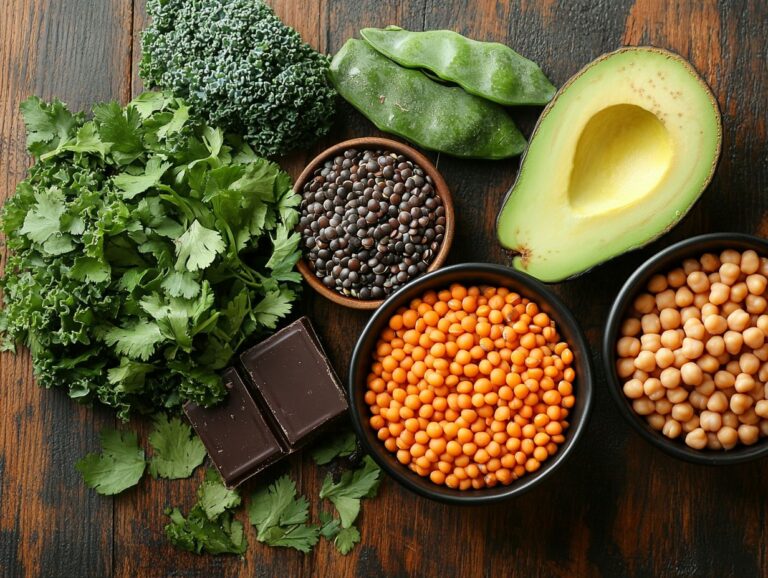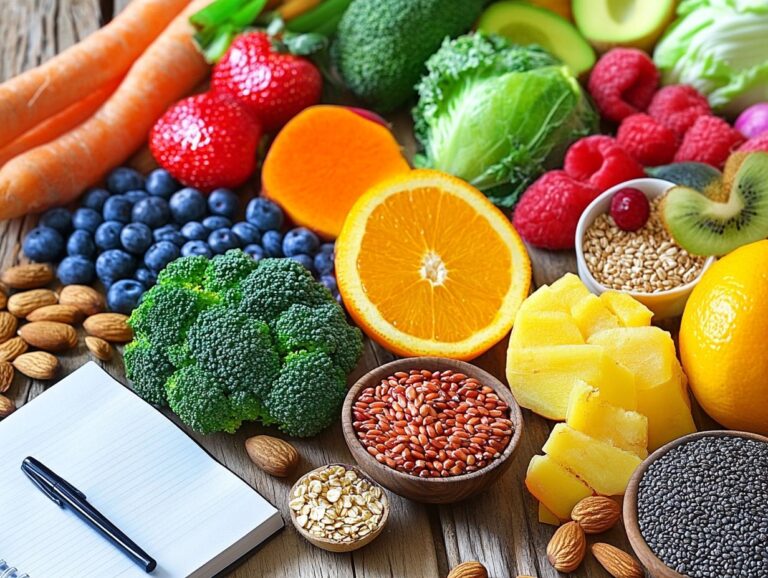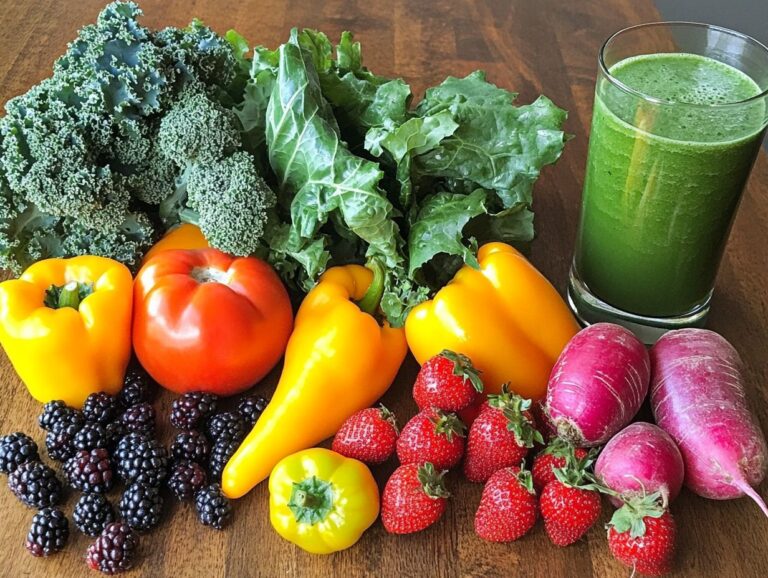Candida overgrowth can be a frustrating health issue that affects various aspects of well-being, from digestion to mood. One promising approach to address this problem is adopting a vegan diet, which emphasizes whole, plant-based foods that can help restore balance in the body. This article explores what Candida is, the causes of its overgrowth, and how a vegan lifestyle, rich in specific antifungal foods, plant-based foods, and probiotics, can support healing. You will discover tips, benefits, and a variety of vegan-friendly foods that can effectively combat Candida while promoting overall wellness.
Key Takeaways:
- A vegan diet can help combat candida by addressing the root causes of the overgrowth, promoting overall gut health, and incorporating antifungal foods.
- Focusing on whole foods, incorporating probiotic-rich foods, and limiting sugar and processed foods are key tips for following a vegan diet to combat candida.
- Vegan-friendly foods such as garlic, coconut oil, leafy greens, fermented foods, and other prebiotic foods can help fight candida and should be incorporated into a vegan diet for maximum benefits.
What is Candida?

Candida, particularly Candida albicans, is a type of yeast that naturally resides in the body, primarily in the gut. While it can be a part of the human microbiome, an overgrowth of this yeast can lead to various health problems.
Such overgrowth may result in symptoms like fatigue and digestive issues, and it may also be associated with chronic diseases. Understanding Candida, particularly Candida albicans, is crucial for managing health concerns related to gut health, maintaining the balance of microorganisms within the human body, and addressing potential yeast infections.
What Causes Candida Overgrowth?
Candida overgrowth is associated with a weakened immune response, dietary restrictions, and food intolerances that disrupt the natural balance of gut microbiota, leading to yeast infections and other chronic health issues. In many cases, an unhealthy lifestyle characterized by a high-sugar diet, frequent antibiotic use, and chronic stress exacerbates this imbalance.
Diets rich in refined carbohydrates and sugars can promote the proliferation of Candida, a common issue in candida diets, while low-fiber diets hinder the growth of beneficial bacteria that help control yeast levels.
Individuals with compromised immune systems, whether due to autoimmune diseases or chronic illnesses, are often more susceptible to fungal overgrowth, which can contribute to various chronic conditions, including gastrointestinal disorders and chronic fatigue syndromes. Herbal remedies and natural treatments can also be considered to support the immune system.
This highlights the importance of comprehensive health management that encompasses dietary oversight and lifestyle adjustments.
What is a Vegan Diet?
The vegan diet, like a vegetarian diet, is a plant-based eating pattern that excludes all animal products, including meat, dairy, and eggs. This diet emphasizes whole foods, organic foods, and non-GMO products, which can all contribute to a healthier lifestyle.
A vegan diet primarily consists of fruits, fresh vegetables, legumes, gluten-free grains, nuts, and seeds, which serve as the main sources of nutrients and healthy protein sources.
Many people adopt a vegan diet alongside various other dietary restrictions and health goals, which often encourage the consumption of nutrient-dense foods, including low GI fruits and green vegetables, and help minimize the risks of harmful exposures.
What Foods are Allowed on a Vegan Diet?
A vegan diet encompasses a wide variety of foods, with a strong emphasis on whole, plant-based options. This includes non-starchy vegetables, low-sugar fruits, gluten-free grains, and healthy fats such as olive oil and coconut oil, which are essential components of a healthy diet.
This diverse culinary approach not only supports environmental sustainability but also offers significant health benefits through a rich array of nutrients and helps fill nutritional gaps.
Non-starchy vegetables like kale, broccoli, and bell peppers are low in calories and high in vitamins, minerals, and antioxidants, which are essential for disease prevention.
Low-sugar fruits, such as berries and avocados, are abundant in healthy fiber and fatty acids, contributing to improved heart health and digestion.
Gluten-free grains like quinoa and brown rice serve as excellent sources of carbohydrates and proteins, aiding in energy production.
Additionally, healthy fats from sources like nuts and seeds play a crucial role in a vegan diet by enhancing nutrient absorption and providing heart-healthy omega-3 fatty acids, underscoring the importance of these foods in a plant-based lifestyle.
What Foods Should be Avoided on a Vegan Diet?
A vegan diet excludes all animal products, including meat, dairy, and eggs, as well as highly processed foods and artificial sweeteners.
These food restrictions are rooted in both health considerations and ethical beliefs that prioritize animal welfare, environmental sustainability, and the avoidance of artificial sweeteners and other harmful additives. Many highly processed foods contain additives and preservatives that either lack nutritional value or have negative effects on overall health.
Additionally, artificial sweeteners, often used as low-calorie sugar substitutes, are linked to various health issues, ranging from mood and anxiety disorders to metabolic syndrome and obesity.
By avoiding these items, including highly processed foods and artificial sweeteners, individuals who adopt a vegan lifestyle can align their eating habits with their values while also promoting their physical health through a clean, nutritious, and environmentally sustainable diet.
How Can a Vegan Diet Help with Candida?
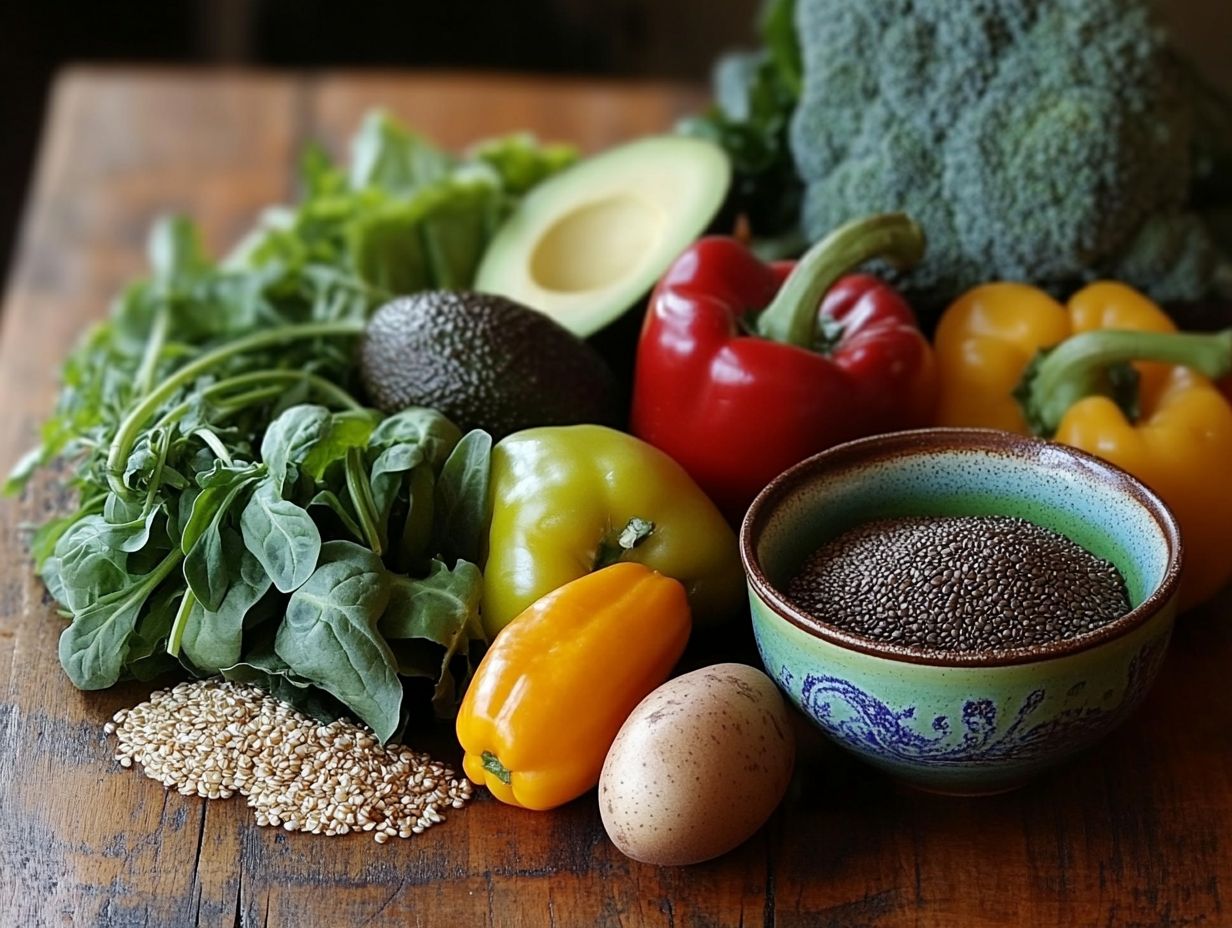
A vegan diet is essential for treating Candida infections as it emphasizes antifungal foods and promotes overall gut health, both of which are crucial for maintaining a strong immune system and proper gut microbiota balance.
This diet limits the intake of sugars and processed foods that can promote yeast overgrowth, while also incorporating a variety of whole, nutrient-dense foods that enhance the body’s natural defenses.
What Are the Benefits of a Vegan Diet for Candida?
A vegan diet can be beneficial for treating Candida, offering several advantages such as improved gut health, enhanced immune function, and access to a variety of antifungal foods that naturally detoxify the body.
Individuals who strictly adhere to a plant-based lifestyle tend to minimize their intake of processed sugars and unhealthy fats, both of which contribute to Candida overgrowth.
Foods high in fiber, including leafy greens, legumes, and whole grains, promote proper digestion and create a gut environment that is less conducive to fungal growth by supporting healthy gut microbiota and preventing harmful bacteria proliferation.
Additionally, the high levels of antioxidants found in fruits and vegetables can help reduce inflammation and oxidative stress, thereby enhancing the immune system’s ability to combat Candida infections.
The inclusion of fermented foods such as sauerkraut and kimchi may also support gut flora; however, there is limited evidence regarding their effectiveness in treating Candida.
How Does a Vegan Diet Address the Root Causes of Candida?
A vegan diet can effectively counter the causes of Candida by promoting a healthy gut microbiota, reducing harmful bacteria, and preventing the chronic diseases often associated with yeast overgrowth due to dietary restrictions.
Consuming a variety of fruits, vegetables, legumes, and whole grains provides the body with essential nutrients that support immunity and digestive health. These plant-based foods are rich in fiber, which acts as a prebiotic that nourishes healthy gut bacteria and promotes their growth.
This not only helps to correct the microbial imbalance commonly associated with Candida but also reduces inflammation. A healthier gut significantly lowers the risk of chronic diseases such as diabetes and heart disease, highlighting the importance of a vegan lifestyle and anti-Candida diet for long-term health.
What Are Some Tips for Following a Vegan Diet to Combat Candida?
A healthy vegan diet for managing Candida includes whole foods, probiotic-rich foods, and a low intake of sugar and processed foods.
Additionally, dietary supplements may support Candida treatment.
1. Focus on Whole Foods
Whole foods in a vegan diet are essential for maximizing nutrient absorption and providing the body with the vitamins and minerals necessary to combat Candida and maintain overall gut health.
Key components of a vegan anti-Candida diet include:
- Fruits
- Vegetables
- Legumes
- Nuts
- Seeds
These components promote optimal gut health. Natural foods are particularly beneficial due to their high fiber content, which aids digestion and fosters a healthier microbiome by serving as nourishment for beneficial bacteria.
Incorporating a variety of whole foods can enhance overall well-being, including increased energy levels, improved mental clarity, and a reduced risk of chronic diseases. By prioritizing whole foods, individuals can better support their immune systems and overall vitality, both of which are crucial for a robust defense against disease.
2. Incorporate Probiotic-Rich Foods
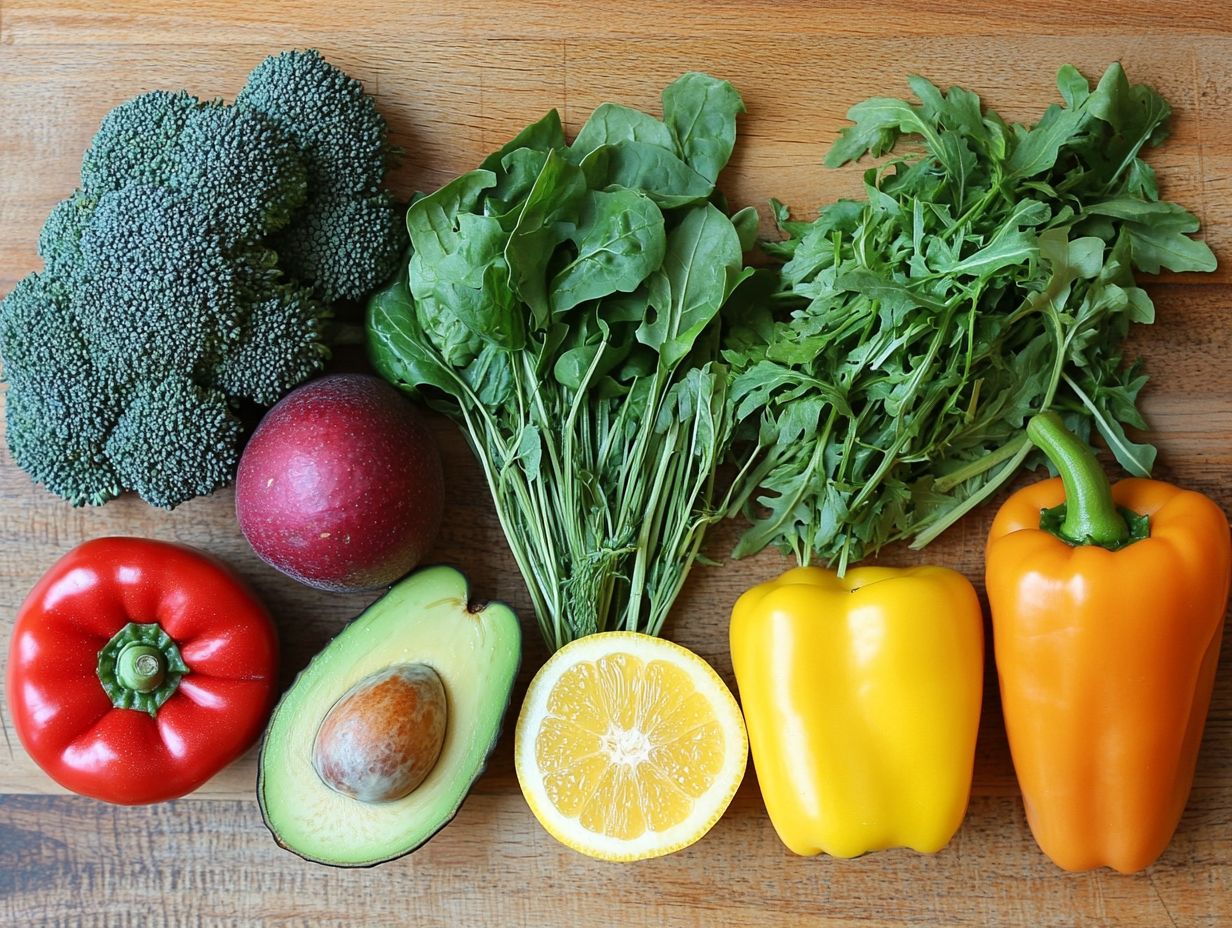
Probiotic foods, such as fermented vegetables, kombucha, and cultured foods, can enhance gut health and help manage Candida overgrowth within a vegan diet by balancing the gut microbiota.
These foods are rich in beneficial bacteria that improve the microbiome, stimulate digestion, and enhance nutrient absorption. Kimchi and sauerkraut, for example, are packed with vitamins and provide live cultures that promote overall health.
Plant-based yogurt, almond milk, and miso are especially well-suited for a vegan diet, creating an environment that inhibits the growth of Candida. These foods support immune function and bolster the body’s natural defenses against fungal overgrowth, making them essential for vegans seeking to improve gut balance.
3. Limit Sugar and Processed Foods
Limiting sugar and processed foods is essential in a vegan Candida diet, as these substances can exacerbate yeast overgrowth and lead to various related health issues. Natural sweeteners like stevia and Manuka honey can be good alternatives.
Consuming high levels of sugar and heavily processed ingredients creates an environment in the gut where yeast overgrowth can thrive, potentially causing symptoms such as constant fatigue, digestive issues like constipation or bloating, and even skin rashes or irritation. This condition is often linked to Candida albicans, a common yeast infection.
Maintaining a healthy gut microbiome becomes increasingly challenging when these foods dominate a person’s diet, as they can disrupt the balance of beneficial bacteria necessary for optimal digestion and nutrient absorption. Incorporating prebiotic foods can help support gut health by feeding the beneficial bacteria.
To mitigate these risks, individuals should focus on incorporating more whole foods and non-starchy vegetables, such as:
- Leafy green vegetables, including green vegetables like kale and spinach
- Nuts
- Seeds
while using natural sweeteners like stevia or monk fruit in moderation. Additionally, emphasizing fermented foods such as sauerkraut or kimchi can enhance gut health by introducing beneficial probiotics and cultured foods that help regulate Candida levels.
4. Consider Supplements
Supplements play a vital role in a vegan diet by ensuring adequate nutrition and aiding the body’s fight against Candida through herbal treatments and essential vitamins. These supplements can include natural treatments and herbal remedies.
For those following a vegan diet, the consumption of specific supplements is often necessary to maintain overall health and to address the challenges associated with Candida overgrowth, especially in the context of a Candida cleanse or anti-Candida diet.
Probiotics are particularly important for gut health, as they help restore the healthy bacteria that can be disrupted by Candida.
Herbal supplements such as garlic and oregano oil may also help reduce Candida levels due to their antifungal properties. Additionally, zinc is an essential supplement that supports immune function and possesses antifungal qualities.
These types of supplements can help address nutritional deficiencies and assist the body in combating Candida effectively.
What Are Some Vegan-Friendly Foods That Can Help Fight Candida?
Several vegan-friendly foods can help combat Candida and support a Candida Diet, including garlic, coconut oil, leafy greens, and a variety of fermented foods.
These items possess antifungal properties and contribute to overall gut health, acting as both antifungal foods and probiotic foods.
1. Garlic
Garlic is well-known for its antifungal properties and can be a powerful addition to a vegan diet, particularly for combating Candida and boosting the immune system. It is an excellent example of vegan foods that also serve as antifungal foods.
Rich in allicin, garlic not only serves as an effective antifungal agent but also enhances the overall immune response.
It can be easily incorporated into meals—whether by adding minced garlic to a vegetable stir-fry, blending it into homemade hummus, or steeping it in olive oil for a dressing.
Including garlic in your daily cooking routine can enhance the flavor of many dishes while providing various health benefits, making it a versatile ingredient for anyone looking to eat healthier and adopt a plant-based diet.
2. Coconut Oil
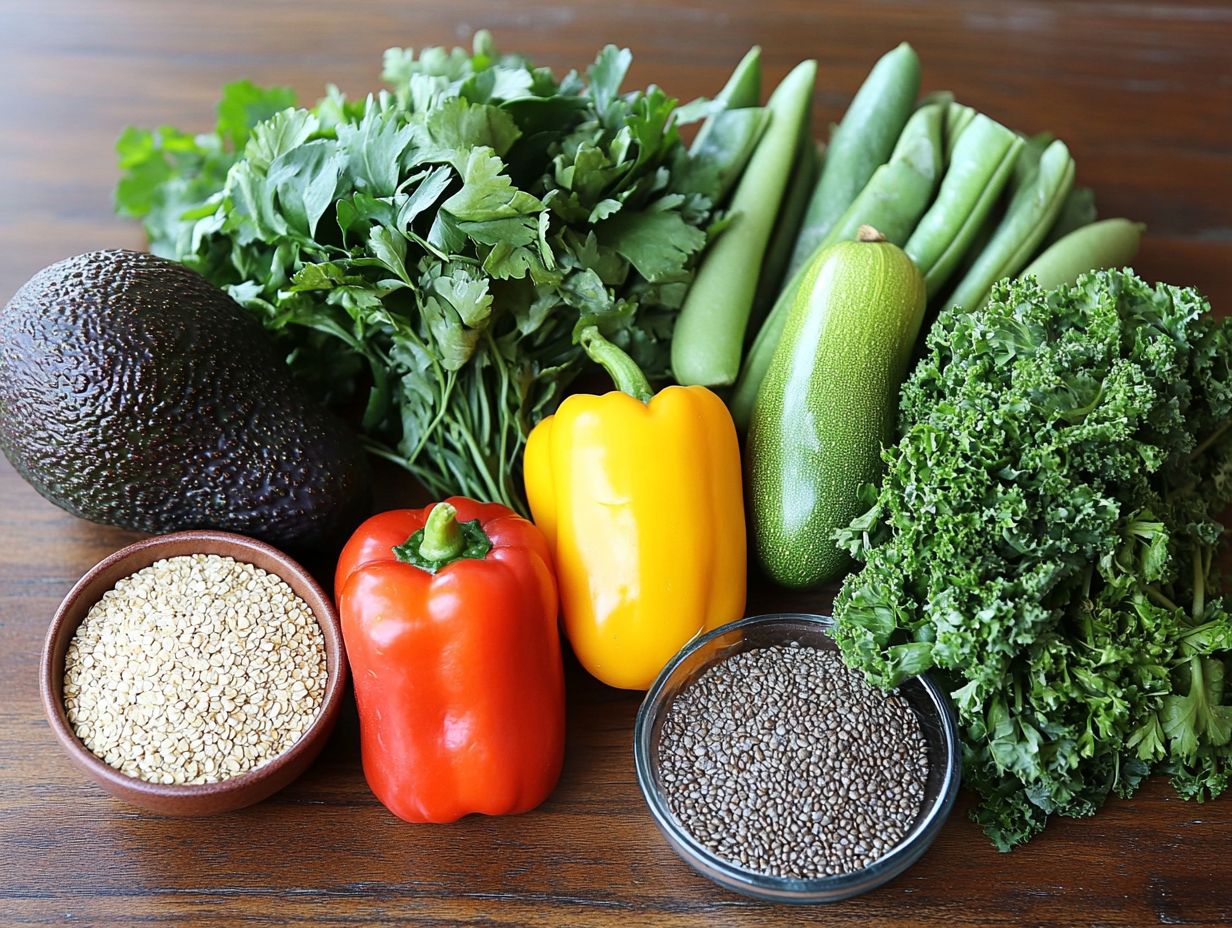
Coconut oil is a valuable addition to a vegan diet due to its antifungal properties and healthy fats, which can help combat Candida. It is particularly beneficial as part of an anti-Candida diet. One of its benefits is its ability to support cell membrane integrity; the medium-chain fatty acids found in coconut oil strengthen and repair cell membranes, including those of intestinal cells. This, in turn, helps prevent the overgrowth of harmful bacteria and fungi like Candida, promoting a healthy microbiome and improving digestion.
Furthermore, coconut oil is versatile and can be used as a cooking oil. Its neutral flavor enhances the taste of various dishes, while it also serves as an excellent source of medium-chain triglycerides (MCTs), which provide a quick source of energy—especially beneficial for those following a vegan diet.
Research published in the Journal of Medicinal Food indicates that coconut oil possesses strong antifungal properties that can help combat fungal infections, such as candidiasis, particularly in the digestive tract. As a medium-chain triglyceride (MCT), it can rapidly eliminate Candida cells. MCTs, which are a type of saturated fat, are highly effective at keeping the immune system functioning optimally, making coconut oil particularly advantageous for individuals on a strict vegan diet.
Additionally, coconut oil is a good source of vitamins C and E, known for their strong antioxidant properties that help scavenge free radicals. This can contribute to reduced inflammation and promote better gut health, which is especially beneficial for vegans and vegetarians who follow a diet rich in plant-based foods and low-sugar fruits.
While coconut oil should be used in moderation, it can serve as an excellent source of energy and nutrition for those who may be lacking essential nutrients from a purely plant-based diet.
3. Leafy Greens
Leafy greens are essential vegan-friendly foods that provide important nutrients and support gut health, which is vital in treating Candida. They are rich in vitamins A, C, and K, making them some of the most nutrient-dense plants available, with high levels of antioxidants and phytochemicals. They are a crucial part of a healthy diet and candida cleanse.
Additionally, leafy greens are high in fiber, which can help maintain a healthy digestive system. Consuming a variety of leafy greens allows individuals to obtain more antioxidants and phytochemicals that help reduce inflammation and toxic buildup in the gut. These foods are often included in gluten-free grains and low GI fruits for their health benefits.
The fiber found in kale, spinach, and Swiss chard contributes to a balanced microbiome, promoting the growth of beneficial bacteria and preventing the overgrowth of Candida and other harmful pathogens.
4. Fermented Foods
Fermented foods such as sauerkraut and kombucha are vital probiotic-rich components of a vegan diet that help improve gut health and combat Candida. Along with these well-known options, kimchi, tempeh, and miso are other cultured foods containing important probiotics that contribute to a diverse gut microbiome.
These foods not only serve as rich sources of beneficial bacteria but also provide enzymes and nutrients that support overall health. Regular consumption of these fermented products can help balance the microbiota and facilitate the fight against Candida overgrowth.
The lactic acid produced during fermentation aids digestion and reduces inflammation, creating a healthy environment for a thriving gut. By incorporating a variety of these fermented staples into their meals, individuals on a plant-based diet can enjoy numerous health benefits, including immune benefits and anti-inflammatory foods, while savoring diverse flavors.
How Long Does it Take to See Results from a Vegan Diet for Candida?
The timeline for observing results from a vegan diet for Candida treatment can vary significantly depending on individual factors, including overall health, the presence of chronic diseases, and adherence to dietary guidelines and recommendations.
What Factors Can Affect the Timeline for Healing?
Several factors, including individual dietary restrictions, immune system health, and pre-existing conditions, can influence the healing timeline from Candida while following a vegan diet. These factors play a crucial role in determining the duration of the healing process. Additionally, consuming a variety of vegan foods and vegetarian foods can aid in detoxification and nutrient absorption.
For instance, a strict vegan regimen that is nutritionally dense and low in processed ingredients may expedite recovery due to its limited food options. Conversely, an impaired immune system or chronic underlying health issues can significantly prolong the time needed for recovery.
Additionally, factors such as exercise, stress management, and sleep can positively affect the body’s ability to eliminate Candida, thereby influencing the healing timeline on a vegan diet.
Is a Vegan Diet Suitable for Everyone with Candida?
A vegan diet offers numerous benefits for managing Candida; however, it may not be suitable for everyone, particularly for those with specific dietary restrictions or health conditions that necessitate tailored nutritional interventions.
Are There Any Potential Risks or Side Effects?
The risks and side effects of a vegan diet include an increased likelihood of nutritional deficiencies, which may exacerbate Candida overgrowth, as well as a higher risk of food intolerances. Ensuring a balance of fresh vegetables, healthy fats, and dairy alternatives can mitigate these issues.
These nutritional deficiencies can arise from the exclusion of animal products, which are primary sources of essential nutrients such as vitamin B12, iron, and omega-3 fatty acids. A deficiency in these nutrients may impair the immune system’s function, making it more difficult for the body to control naturally occurring Candida species.
Additionally, individuals following a vegan lifestyle may inadvertently consume high levels of carbohydrates and sugars from fruits and grains, which can further feed Candida, increasing the risk of inflammation and digestive discomfort.
Seeking Professional Guidance for a Vegan Diet to Combat Candida
Seeking professional guidance when adopting a vegan diet to combat Candida is essential for ensuring health benefits and effectively addressing potential nutritional gaps related to protein sources and living organisms in the diet.
By consulting healthcare professionals or nutritionists, individuals can develop a personalized dietary plan that not only focuses on eliminating Candida overgrowth but also ensures that they meet all their nutritional needs, particularly in terms of prebiotics, probiotics, and anti-Candida foods.
These experts can evaluate specific health concerns, such as vitamin deficiencies, and recommend suitable plant-based alternatives that are rich in essential nutrients. They can also provide valuable insights into meal planning and food combinations that may enhance digestion and overall wellness. Including non-GMO products and organic foods can further improve dietary outcomes.
Although navigating dietary changes can be challenging, informed support makes it significantly easier to manage Candida while maintaining a balanced vegan lifestyle.
